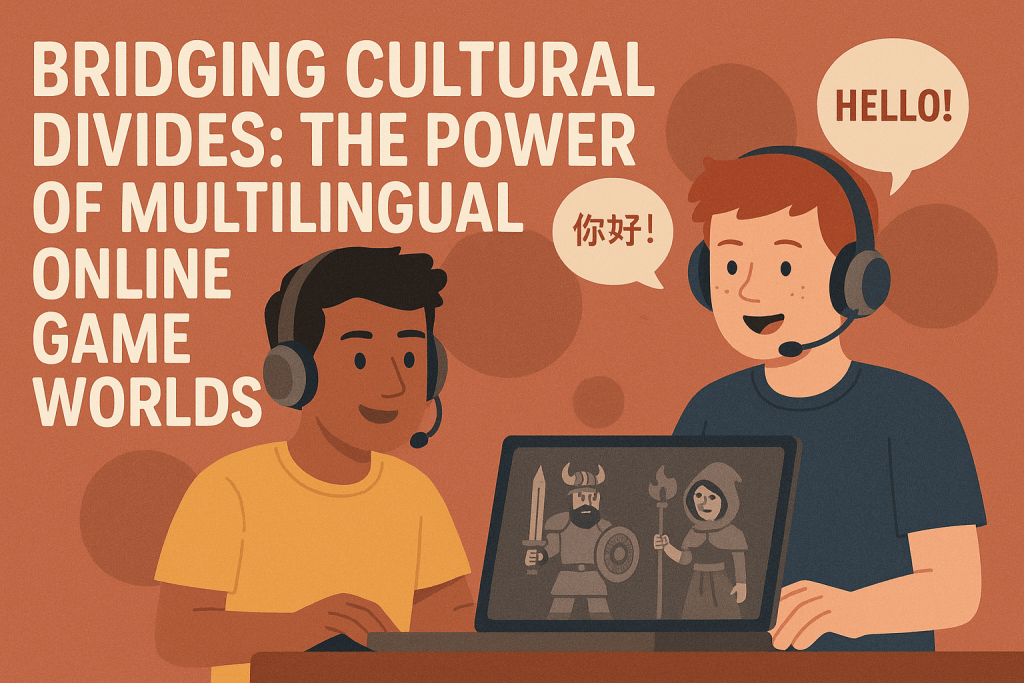The world of online gaming has undergone a significant transformation in recent years, with the rise of global gaming communities and the increasing importance of languages in shaping these communities. As gamers from diverse linguistic and cultural backgrounds come together to play and interact, the need for multilingual online game worlds has become more pressing than ever. In this context, innovative solutions like the Win bd app have emerged, allowing gamers to connect with others across the globe and facilitating communication across language barriers. By providing a platform for gamers to interact and play together, these solutions are helping to break down cultural and linguistic divides and create a more inclusive and diverse gaming community.

Introduction to Multilingual Online Game Worlds
The concept of multilingual online game worlds refers to virtual environments where gamers can interact and play together, regardless of their linguistic or cultural backgrounds. These worlds are designed to be inclusive and accessible, with features such as language translation tools, cultural adaptations, and community-driven initiatives that promote cross-cultural understanding and exchange. By creating a shared space where gamers can come together and engage with each other, multilingual online game worlds are helping to foster a sense of global community and cooperation, while also promoting language learning and cultural exchange. For instance, online games like World of Warcraft and Final Fantasy XIV have implemented language translation tools, allowing players to communicate with each other across language barriers and creating a more immersive and inclusive gaming experience.
The Impact of Languages on Global Gaming Communities
Languages play a crucial role in shaping global gaming communities, influencing the way gamers interact, communicate, and collaborate with each other. In multilingual online game worlds, languages can be both a bridge and a barrier, facilitating communication and cooperation between gamers from different linguistic backgrounds, while also creating challenges and obstacles that can hinder interaction and understanding. For example, language differences can lead to misunderstandings and miscommunications, while cultural references and nuances can be lost in translation, creating confusion and frustration among gamers. However, by acknowledging and addressing these challenges, game developers and publishers can create more inclusive and accessible gaming environments, where gamers from diverse linguistic and cultural backgrounds can come together and engage with each other in a meaningful and enjoyable way.
The Benefits of Multilingual Online Game Worlds
Multilingual online game worlds offer a range of benefits, from promoting language learning and cultural exchange to fostering global community and cooperation. By providing a shared space where gamers can interact and play together, these worlds are helping to break down cultural and linguistic divides, while also promoting cross-cultural understanding and empathy. Additionally, multilingual online game worlds are creating new opportunities for game developers and publishers, allowing them to reach a broader audience and tap into new markets, while also driving innovation and creativity in the gaming industry. For instance, the popularity of online games like League of Legends and Dota 2 has led to the development of new languages and cultural adaptations, such as Chinese and Korean versions of the games, which have helped to expand the games’ global reach and appeal.
Challenges and Opportunities in Multilingual Online Game Worlds
Despite the many benefits of multilingual online game worlds, there are also challenges and obstacles that need to be addressed. One of the main challenges is the complexity of language translation and cultural adaptation, which requires significant resources and investment. Additionally, the risk of cultural insensitivity and linguistic errors can be high, particularly if game developers and publishers are not familiar with the cultural and linguistic nuances of their target audience. However, by acknowledging and addressing these challenges, game developers and publishers can create more inclusive and accessible gaming environments, while also driving innovation and creativity in the gaming industry. For example, the use of machine learning and artificial intelligence can help to improve language translation and cultural adaptation, while also enabling more personalized and immersive gaming experiences.
The Future of Multilingual Online Game Worlds
The future of multilingual online game worlds is exciting and promising, with new technologies and innovations emerging that are set to transform the gaming industry. One of the key trends is the use of virtual and augmented reality, which is creating new opportunities for immersive and interactive gaming experiences. Additionally, the rise of cloud gaming and game streaming is making it possible for gamers to access and play games from anywhere in the world, regardless of their device or location. By leveraging these technologies and innovations, game developers and publishers can create more inclusive and accessible gaming environments, while also driving growth and expansion in the gaming industry. For instance, the development of cloud-based gaming platforms like Google Stadia and Microsoft xCloud is enabling gamers to play high-quality games on any device, while also reducing the need for expensive hardware and infrastructure.
Conclusion
In conclusion, multilingual online game worlds are shaping the future of gaming, promoting language learning and cultural exchange, while also fostering global community and cooperation. By acknowledging and addressing the challenges and obstacles that arise from language and cultural differences, game developers and publishers can create more inclusive and accessible gaming environments, while also driving innovation and creativity in the gaming industry. As the gaming industry continues to evolve and grow, it is likely that multilingual online game worlds will play an increasingly important role, enabling gamers from diverse linguistic and cultural backgrounds to come together and engage with each other in a meaningful and enjoyable way. Ultimately, the power of multilingual online game worlds lies in their ability to bridge cultural divides and create a more inclusive and diverse gaming community, where gamers from all over the world can share in the joy and excitement of gaming.

